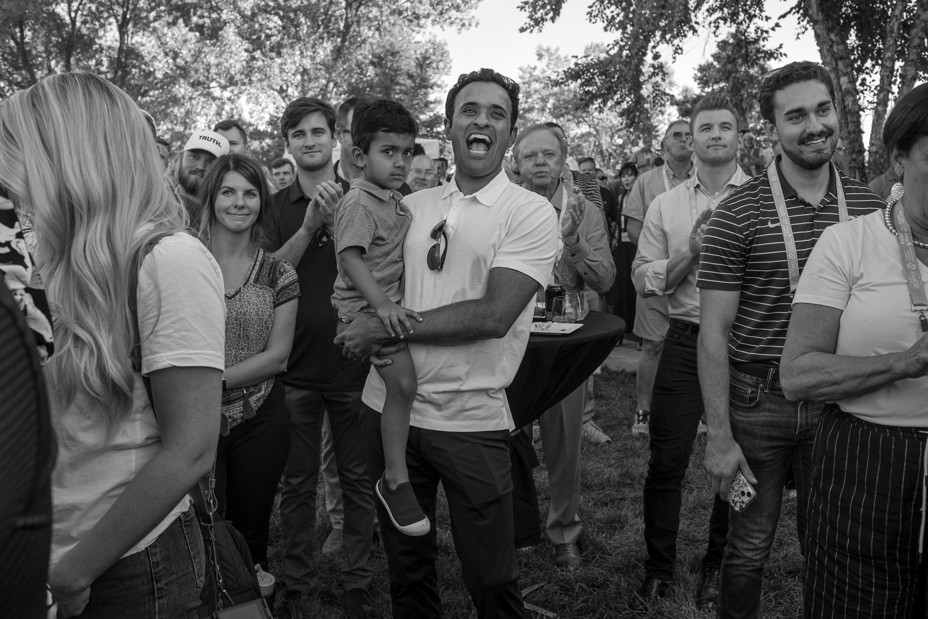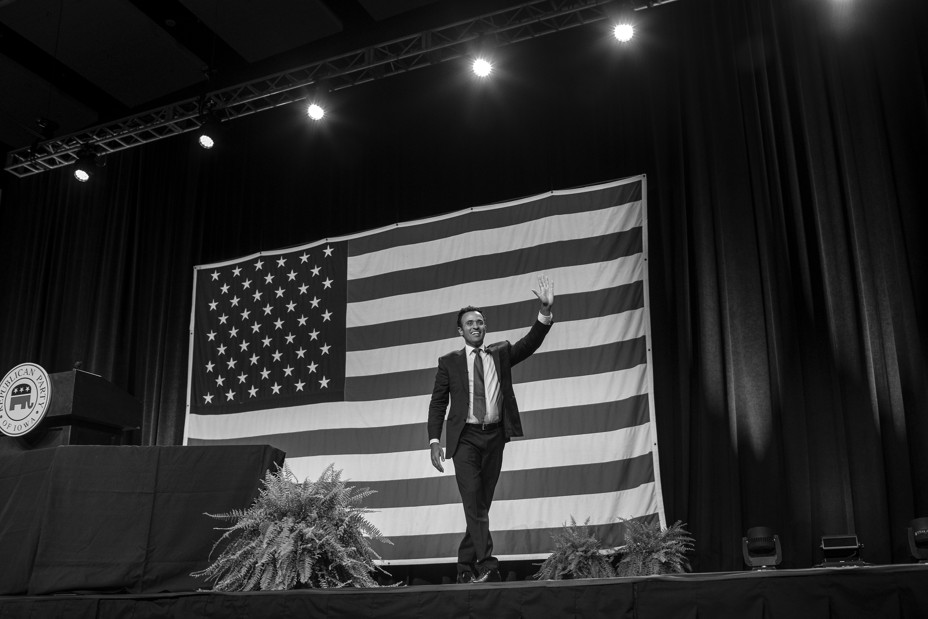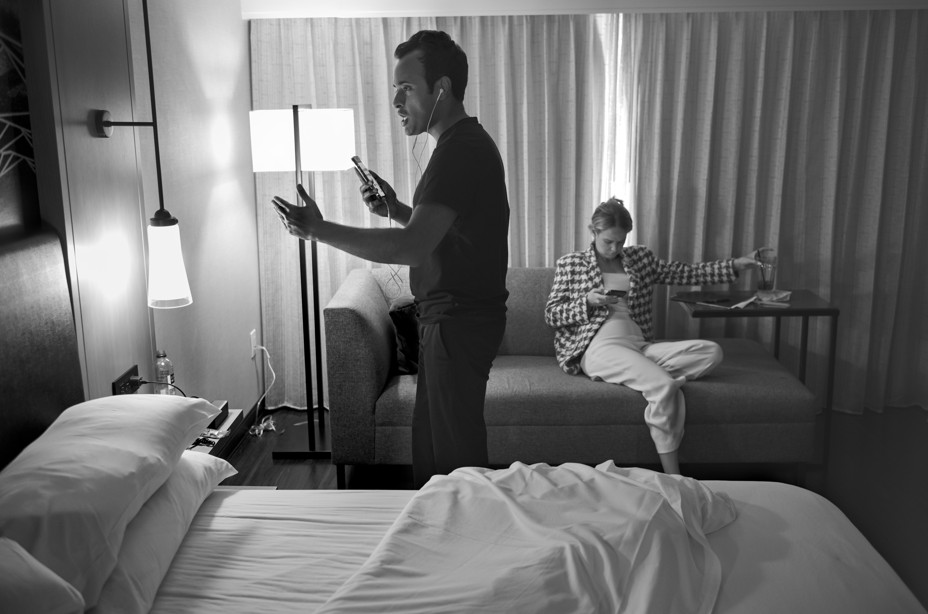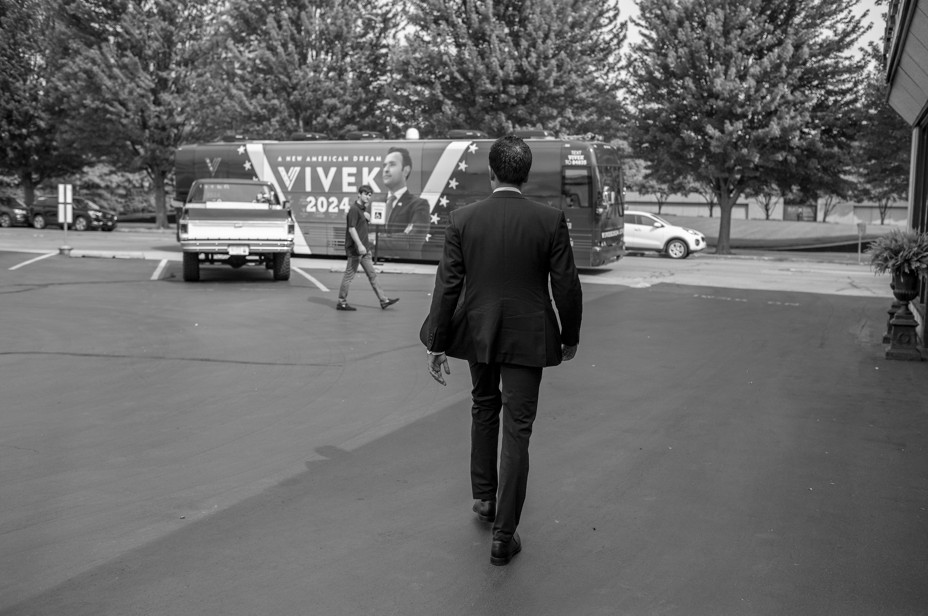Vivek Ramaswamy’s Truth
Photographs by Danny Wilcox Frazier
This article was featured in One Story to Read Today, a newsletter in which our editors recommend a single must-read from The Atlantic, Monday through Friday. Sign up for it here.
Vivek Ramaswamy leaned forward in his leather seat aboard the Cessna 750. He was fiddling with his pen, talking about Donald Trump. It was the final Friday in July. In several hours he’d join his fellow Republican presidential contenders at the Iowa GOP Lincoln Dinner. Ramaswamy—not even 40, zero political experience—was the second-to-last speaker on the bill. Trump, of course, was the headliner.
Ramaswamy is the author of Woke, Inc., a book-length takedown of corporations that champion moral causes along with profits. The treatise was a New York Times best seller and is now part of the American culture-war canon. His first company, Roivant Sciences, netted him hundreds of millions of dollars by bringing a Wall Street ethos to biotech: Drug patents were prospective assets. Another Ramaswamy venture, Strive Asset Management, markets itself as a place where return-on-investment outweighs all else, including concerns about social issues or the environment.
That afternoon’s flight was a short hop, Columbus to Des Moines. As the private jet barreled west, Ramaswamy sipped a Perrier and scribbled his thoughts in a large notebook. It was on a flight like this, he told me, where he sketched out his 10 “truths”:
God is real. There are two genders. Human flourishing requires fossil fuels. Reverse racism is racism. An open border is no border. Parents determine the education of their children. The nuclear family is the greatest form of governance known to mankind. Capitalism lifts people up from poverty. There are three branches of the U.S. government, not four. The U.S. Constitution is the strongest guarantor of freedoms in history.
“I just wrote down things that are true,” he said flatly. “It took me about 15 minutes.”
Ramaswamy doesn’t consider himself a culture warrior; he insists that he is merely speaking the truth. He presents his ideas as self-evident, eternal truths. I asked him if he believes that truths can change over time. For instance, what did he make of the fact that most white Americans used to view it as a “truth” that Black people were genetically inferior—that they weren’t fully human?
“I don’t think that’s true,” he said.
“It is true,” I said. “That’s partly what justified slavery.”
“But it was a justification; it wasn’t a belief,” he said. “Look at emperors—Septimius Severus in Rome. He was Black. He had dark skin. They viewed dark skin as the way we view dark eyes.”
This is how a debate with Ramaswamy unfolds. He’ll engage with your question, but, when needed, he’ll expand its parameters. If that fails, he’ll pivot to thoughts on the existence of a higher power. “I don’t think that human beings ever accepted that Black people were not created equal in the eyes of God,” he said. (His favorite president, Thomas Jefferson, believed exactly that.)
Here’s where else he’s gone in his quest for the truth. He has tantalized audiences with the idea that Americans don’t know “the truth about January 6” and has argued that those who stormed the Capitol have been lied to and “suppressed.” He argues that people who identify as transgender suffer from a mental-health disorder: “I think there is something else going wrong in that person’’s life, badly wrong,” he has said. He calls race-based affirmative action “a cancer” and vows to end it “in every sphere of American life.” He endorses using the military to secure America’s borders, brokering a deal that would cede a huge chunk of Ukraine to Russia, and defending Taiwan from Chinese aggression “only as far as 2028.” His grandest vision might best be described as the inverse of Franklin D. Roosevelt’s New Deal: a demolition of the federal government—FBI, CDC, DOE, ATF, IRS—gone.
Ramaswamy radiates confidence: steady eye contact, knowing nod, satisfied smile. He campaigns for up to 18 hours a day. He mostly keeps to a uniform of black pants, black T-shirt, and a black blazer. He operates in a world of declarative statements and punctuates his sentences with “right?” and “actually,” like a tech bro. He’s currently in third place in most national polls. At last month’s Turning Point USA conference, in Florida, Ramaswamy had a breakout moment when 51 percent of straw-poll respondents said he was their second choice for president. “Pretty remarkable how far he’s come in a very short amount of time,” Charlie Kirk, the organization’s founder, tweeted.
Last week, leaked documents designed to inform Ron DeSantis’s strategy at Wednesday’s first presidential debate portrayed Ramaswamy as the candidate to beat. The Florida governor’s super PAC advised him to “take a sledgehammer” to the 38-year-old outsider. Many potential voters will likely be intrigued when they hear Ramaswamy speak his truths onstage this Wednesday. He is living a life they can only dream about: Start a company or two, make half a billion dollars, say whatever you want. And then, naturally, run for president.

A colossal American flag hangs on the outside of Ramaswamy’s spare-no-expense campaign headquarters in Columbus. The property is a former barn; the word TRUTH is plastered everywhere. One communal work area, for phone banking, is roughly the size of a basketball court. He has his choice of two production studios from which to record his never-ending stream of cable-news hits, podcast appearances, and social-media videos.
During my visit, John Schnatter—a.k.a. Papa John—flew in from Kentucky via private helicopter to speak his truth on Ramaswamy’s own nascent podcast, The Vivek Show.
Papa John told the candidate how he became very rich—how his single pizza shop grew into a chain of over 5,000 stores—then turned to a long, complicated story about his downfall. He claims that he was set up by a PR firm that goaded him into saying a racial slur during a private coaching session and that this firm is connected to Hillary Clinton and Jeffrey Epstein. (Reached for comment, a spokesperson for the PR firm referred me to a recent partial summary judgment against Schnatter in the firm’s favor.) He used the words “demonic” and “satanic” to describe the American left. At one point, the conversation veered toward Russia and Hunter Biden’s laptop. “I don’t know why the Creator put me through this,” Papa John said.
[Read: A bouncy, fresh brand of Trumpism]
All the while, Ramaswamy nodded, smiled, or, when applicable, shook his head in disbelief. This was his media-forward candidacy, distilled: a morning behind the mic inside a posh podcast setup chatting with a fellow entrepreneur about the perils of woke capitalism. When the episode aired, he’d have a cautionary tale for listeners, a potentially viral clip that would get him in front of new voters.
The night before, I watched Ramaswamy speak to a couple hundred young conservatives at the Forge Leadership Summit. He looked around the room and preached that “hardship is not a choice, but victimhood is a choice.” It’s one of his favorite lines, and a nod to his second book, Nation of Victims. The crowd that night was almost exclusively white, and Ramaswamy’s inflection was temporarily suffused with twang.
“We’re starved for purpose and meaning and identity at a time in our national history when the things that used to fill our void—faith, patriotism, hard work, family—these things have disappeared,” he said. He rattled off a list of “poisons” that have filled the void, pausing for dramatic beats between each one: “Wokeism. Transgenderism. Climatism. COVIDism. Globalism. Depression. Anxiety. Fentanyl. Suicide.” The crowd murmured.
He kept rolling. He said that Russia’s war against Ukraine is “really just a battle between two thugs on the other side of Eastern Europe.” He warned that incremental change within American institutions is impossible.
Right now, he said, we have reached a “1776 moment” in this country.
“Do we stand on the side of reform?” he asked. “Or do we stand on the side of revolution?”
When he finished, half the people in the room jumped to their feet.

Ramaswamy hurried out and ducked into an SUV: He feared he’d be late for his prime-time interview on Chris Cuomo’s NewsNation show. During the ride, he revisited one of the more challenging audience questions. A woman had asked if, as president, he would commit to making abortion illegal at the federal level. He told her that he is “unapologetically pro-life,” but a strict constitutionalist—an originalist. He said he viewed recent state-level abortion restrictions as victories for federalism. The woman seemed unsatisfied.
Ramaswamy knew that abortion questions would keep coming up. “I do feel like I’m being bullied a little bit on this issue,” he told his aides. They ran through his options. A video? A public address? Suddenly the subject seemed fraught. “Eh, probably an abortion speech isn’t a good idea, to be honest with you,” he said.
After the Cuomo interview, we drove to Ramaswamy’s house. It’s bright and white with giant ceilings—suburban palatial. One of the family’s two nannies appeared and started putting together a spread: chili, kale, watermelon salad, tofu tacos.
Throughout his professional life, Ramaswamy has aimed to be perceived as an American traditionalist who is simultaneously ahead of the curve. He is the son of Indian immigrants and a practicing Hindu. As a high-school student at St. Xavier, a Jesuit prep school in Cincinnati, he quickly got up to speed on all things Bible. On the campaign trail, he frequently invokes spirituality, and his message has the feel of old-school Christianity.
[Read: What the polls may be getting wrong about Trump]
Growing up, he loved hip-hop, especially Eminem, and his own performances under his alter-ego “Da Vek” as a Harvard student landed him in The Crimson. He still occasionally leans into it. The day we met, he had just freestyled on Fox News. Earlier this month, he grabbed the mic and did an Eminem impression at the Iowa State Fair.
Though now running as a Republican, he long identified as a libertarian. He cast his first vote, when he was a 19-year-old, in the 2004 election, supporting the Libertarian candidate Michael Badnarik. (He sat out every subsequent presidential election until 2020, when he voted for Trump.)
Ramaswamy told me a story about how in eighth grade, he was pushed down a flight of stairs at his public school. Though he underwent hip surgery afterward, he was careful not to portray himself as a victim. Instead, he described the event as the catalyst for his arrival at St. Xavier.
I asked him about coming of age in the post-9/11 world, when many ignorant Americans assumed that anyone with brown skin might be a terrorist. He told me about the experience of being singled out and questioned while flying to Israel—that unique sensation of being the last passenger permitted to board. “I didn’t chafe at that, though, because, honestly, in some ways it was data-driven,” he said. I asked if he considered the action itself to be racist. “No, I think racism has to involve some level of animus, actually,” he said. “I have experienced racism, to be clear. But that’s not—I don’t think that entails animus. So it doesn’t qualify as racism to me.”
He told me he doesn’t believe his race will negatively affect his electability in 2024. He said that among most GOP voters, the No. 1 political problem is “not, like, Arabs right now.” He spoke of what he saw as other underlying American anxieties, such as “the feeling of being victimized right here at home,” he said. “Forces that are different than Mohamed Atta,” he added, alluding to one of the 9/11 hijackers.

Ramaswamy’s wife, Apoorva, was leaning on the kitchen island, listening to our conversation. After her husband slipped away to hop on a Zoom call with “a bunch of people from Silicon Valley,” she joined me at the table. She was fighting a cold but nonetheless happy to make time for a stranger in her home at nearly 10 p.m. on a weeknight. Besides, she said, she wanted to wait up for Vivek when he was done for the day.
The couple met at a house party in 2011, when they were both graduate students at Yale. They struck up conversation, realizing they were neighbors. Apoorva was following in her father’s footsteps, studying medicine, while Vivek was pursuing a law degree after a few years working in finance in New York. “He just seemed awesome, like someone who was interesting and someone who was full of life,” she said. “I was pretty sure pretty early on that I was going to probably end up marrying him.”
Apoorva, like her future husband, grew up a practicing Hindu. The couple is now raising their two toddlers, Karthik and Arjun, in the faith. Apoorva’s parents also came to the United States from India. “I think, as a child of immigrants, we defaulted toward being Democrats insofar as we thought about it at all, which was honestly not very much,” she said. In recent years, she told me, her mom and dad had become Trump supporters. “They chose this country—they love this country more than any country in the world, and they believe in it,” she said. “And it was cool” for them “to see someone who was unapologetic about it.”
I asked Apoorva if she could recall the first time Vivek told her he wanted to become president.
“I think that, like, on a serious level, it was …” she paused for a long moment. “This December.” Vivek, she said, saw the presidency as one of “the different options open to him.” Other young, rich men unsure of what to do next with their life have bought a yacht or a big-city newspaper, or run for governor of Texas. Ramaswamy chose the presidency.
[Read: The 2024 U.S. presidential race: A cheat sheet]
Apoorva is a head-and-neck-cancer surgeon at The Ohio State University. I asked her if, as a physician, she supported vaccines. She told me that she and her entire family had received COVID shots, but like her husband, she endorses the idea of personal choice over government mandates. This libertarian approach permeates many aspects of their life. Instead of sending their kids to public school, they have “some educators who come to the house.” (She pointed to the special relationship between Alexander the Great and his private tutor, Aristotle, as a model.) Like Vivek, she’s ambitious and career-driven. She told me she doesn’t necessarily plan to give up her job at OSU even if her family moves into the White House. “I think Jill Biden did show that it is possible to be a spouse who is working,” she said.
“This is a totally new world for me, and the concept of being a political spouse is not, like, the fifth thing I would call myself,” she said. “It’s, you know, this is the thing we’re doing, for sure. And I’m proud to support my husband in it. But I think this is about him and his vision. This is not about me.”
The next day, in Des Moines, Ramaswamy periodically stepped away from our interview aboard his campaign bus to play with his older son, Karthik, who had come along for the trip. I asked Ramaswamy if his friends and family were surprised when he told them he was running for president.
“Not shocked, but a combination of excited and personally concerned for me, actually—just knowing how dirty this is,” he said. “I’m pretty uncompromising. And I think most people have an impression that politics is a dirty sport where you have to, you know, be compromised.”
I brought up something Papa John had told him: This wasn’t a knife fight, but a gunfight.
“I mean, I would phrase it differently, but I would say you need a spine of steel to play this sport, for sure,” Ramaswamy said. “Some people who have been coddled in their siloed kingdoms, mini kingdoms they’ve created for themselves, have not been ready for when they’ve shown up for the real thing. I think it was an advantage not to be surrounded by people who heaped false praise on me in one of the 50 states of the union—I think that’s a trap that certain governors almost every cycle have fallen into.”
He smiled, making it clear that he was going out of his way not to invoke his closest rival, Ron DeSantis, by name.
While DeSantis spent the first stretch of his campaign blackballing the mainstream media, Ramaswamy has taken a different approach. His presidential candidacy was preceded by a profile in The New Yorker, and though he himself is perpetually on cable news, he said he hardly ever tunes in. With one exception: “I think Tucker Carlson was great, actually. I really enjoyed watching him.”
“I think Tucker had something to say,” he said. “We’re not slaves to a partisan orthodoxy. I don’t have a particular affinity for the Republican Party apparatus, and I think neither does Tucker.”
He told me he admired how Carlson wasn’t a “delivery mechanism” for something that showed up on the teleprompter. I asked if he had read any of the evidence that came out in the discovery process of the Dominion Voting Systems lawsuit against Fox News, the case that ultimately led to Carlson leaving the network. “I really didn’t,” Ramaswamy said. “It didn’t strike me as super interesting because it seemed like a lot of inside baseball.” I told him that Carlson had been saying certain things on air and, in some cases, texting the direct opposite to his producer. For instance: He said he hates Trump. “Did he say that?” Ramaswamy asked.
For a moment, he seemed genuinely surprised.

“Most people have barely heard of me,” Ramaswamy admitted to Elon Musk. He was pacing barefoot around his 30th-floor downtown–Des Moines hotel room, doing a live Twitter (X) Spaces broadcast. It was late Friday afternoon, just a few hours before the Lincoln Dinner. Half-eaten takeout was idling in clamshell containers. Ramaswamy had been going nonstop but didn’t seem remotely tired.
Musk and his Silicon Valley friend David Sacks had been trying to make the social network’s shaky audio platform a virtual destination on the 2024 campaign trail, with intermittent success. I could hear Musk’s voice through Ramaswamy’s earbuds. Over and over again, he’d interrupt the candidate. If Ramaswamy was frustrated, he didn’t let it show. After having watched several of his media hits in a row, I noticed how Ramaswamy had developed an array of tricks to wrangle attention, such as when he brought up “our mutual friend Peter,” as in Thiel. He told Musk how much he “loved” the Twitter Files. By the end of the broadcast, he seemed to have made a new fan. Last week, Musk called him “a very promising candidate.”
He continues to find support among a group of very online iconoclasts. “That Vivek guy is very interesting,” Joe Rogan said recently. “He’s very rational and very smart.” Jordan Peterson has praised him as “hard to corner in the best way.” Andrew Yang, who ran as a freethinking businessman in the 2020 Democratic primary, told me he believes that people are just waiting for others to rally behind Ramaswamy. “Vivek’s going to have his moment. There’s going to be a wind at his back. And then when that wind hits, I think people will be stunned at how quickly his support grows.”
At the Iowa Events Center, more than 1,000 people listened politely as 13 Republican candidates (pretty much the entire field except Chris Christie) each made a 10-minute case for themselves. DeSantis announced that “The time for excuses is over!” before clomping away in his heeled boots. Senator Tim Scott of South Carolina preached the value of hard work, telling the room that President Joe Biden and the left were selling “a narcotic of despair.” Former Vice President Mike Pence trudged through his speech and received hardly any applause when endorsing the idea of a federal abortion ban after 15 weeks of pregnancy.
[Read: The bow-tied bard of populism]
Just after 8 p.m., Ramaswamy was waiting offstage, looking over his notes. He bounded up the steps to the sounds of Brooks & Dunn’s “Only in America.”
“It’s good to be here, back in Iowa. I feel like I live here now!” Ramaswamy told the crowd.
He was speaking slower than usual, and he had ditched the twang from the previous night. He seemed utterly at ease. He talked about securing our southern border “and our northern border too.” He received lively applause after saying he would shut down scores of three-letter government agencies. He cycled through his list of poisons and his 10 truths. The clapping waxed and waned. His line about “two genders” was a hit, as was his finale about the Constitution. All in all, he received one of the strongest responses of the night: When the speech concluded, he was treated to a partial standing ovation. He paused for a few extra moments to take it all in, waving at the crowd with both hands.
Downstairs, Ramaswamy glowed in his after-party suite. “Eye of the Tiger” and “Born in the U.S.A.,” and a series of country songs blared from speakers. He told the few dozen people before him that he was prepared not only to win the nomination but to deliver a Ronald Reagan–style landslide victory. Some seemed convinced.

The next morning, as his campaign bus lumbered to rural Hubbard, I asked Ramaswamy if he had heard what his fellow Republican Will Hurd had said at the event. Hurd, a former Texas congressman, was booed off the stage after telling the Lincoln Dinner crowd “the truth”: that Trump was running only to stay out of prison. “I know the truth,” Hurd said. (Loud boos.) “The truth is hard.” (Louder boos.)
Ramaswamy waved away Hurd’s assertion. He told me that if Trump weren’t running, “they” wouldn’t be prosecuting him. With each passing month, with each new indictment, Ramaswamy has doubled down on his public promise to pardon Trump if elected. He told me that he believes doing so would be “the right thing for the country.” He said the indictments, so far, were “obviously politically motivated.”
During one of his “truth” monologues at the Lincoln Dinner, Ramaswamy told the crowd, “We can handle the truth about what really happened on January 6.” As the bus rolled north, I asked him: What is the truth about January 6?
“I don’t know, but we can handle it,” he said. “Whatever it is, we can handle it. Government agents. How many government agents were in the field? Right?”
Then, suddenly, he was talking about 9/11.
“I think it is legitimate to say how many police, how many federal agents, were on the planes that hit the Twin Towers. Maybe the answer is zero. It probably is zero for all I know, right? I have no reason to think it was anything other than zero. But if we’re doing a comprehensive assessment of what happened on 9/11, we have a 9/11 commission, absolutely that should be an answer the public knows the answer to. Well, if we’re doing a January 6 commission, absolutely, those should be questions that we should get to the bottom of,” he said. “‘Here are the people who were armed. Here are the people who are unarmed.’ What percentage of the people who were armed were federal law-enforcement officers? I think it was probably high, actually. Right?”
I pressed him on the comparison, and suddenly, the bold teller of truths was just asking questions. “Oh yeah, I don’t think they belong in the same conversation,” he said. “I think it’s a ridiculous comparison. But I brought it up only because it was invoked as a basis for the January 6 commission.”
[Read: A star reporter’s break from reality]
But is he actually confused about who was behind the 9/11 attacks? It was hard to get a straight answer from him. “I mean, I would take the truth about 9/11,” he said. “I am not questioning what we—this is not something I’m staking anything out on. But I want the truth about 9/11.” Some truths, it seems, can be proudly affirmed; others are more elusive. (Asked to clarify Ramaswamy’s views on 9/11, his spokesperson pointed me to a 1,042-word tweet from the candidate, in which he suggested that the U.S. government covered up involvement by Saudi intelligence officials in planning the attacks.)
Ramaswamy told me he’s not interested in being Trump’s vice president, or serving in Trump’s Cabinet. “Reporting in to somebody is not something I’m wired to do well,” he said. “I’m not in this to be a politician. I think there’s a chance to lead a national revival, cultural revival, that touches the next generation of Americans. I don’t think I’m going to be in a position to do that if I’m in an administrative role.”
Unlike Trump, Ramaswamy has signed the “loyalty pledge” to support the eventual GOP nominee—a prerequisite for participation in the debate. He also told me that he would commit to accepting the results of the election. So far, the closest he’s come to ever actually criticizing Trump is saying that 30 percent of the country became “psychiatrically ill” when he was in office. Throughout our discussions, it was clear that Ramaswamy seemed to view Trumpism as something he could tap into. He told me that his path to winning involved recognizing and celebrating Trump’s accomplishments, and promising to build on them.
“I believe with a high degree of conviction that I will win this election,” he said.
If, for whatever reason, that didn’t come to pass, he told me he would “probably just go back to what I was doing”—business, writing books, hanging out with his family. “And I might take a look at the future.”
During our final conversation, I asked Ramaswamy if he felt understood or misunderstood as a candidate. He didn’t hesitate to answer.
“Mostly misunderstood.”
What do you think people misunderstand about you?
“My motivations,” he said.
“I’m not aggrieved by that. I’m patient. But I hope that by the end of this, actually—it’s a deep question—but I think I would rather be properly understood and lose because people decided that the real me is not who they want, than to lose because people never got to know who I really am. That would bother me. And it would be hard to reconcile myself with that. But if people across this country really know just who I am and what I stand for, and then that’s not what they want in a leader, I am 100 percent at peace with that. I have no problem. So that’s kind of my goal in this process.”
The bus pulled onto a sprawling private property in the middle of nowhere. Ramaswamy and his aides hopped off. The millionaire outsider candidate, beholden to no one, was preparing to speak his truth before a wealthy Iowa donor and his friends.
